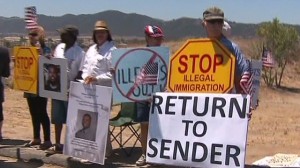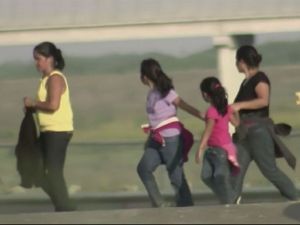 Go to any article, news story or blog discussing the immigration issue and/or the current refugee crisis on our southern border (they’re often conflated), and you will find phrases like the ones below. These are real comments pulled verbatim from comment threads, from blogs and from interviews contained in the news stories about immigration and the current border crisis.
Go to any article, news story or blog discussing the immigration issue and/or the current refugee crisis on our southern border (they’re often conflated), and you will find phrases like the ones below. These are real comments pulled verbatim from comment threads, from blogs and from interviews contained in the news stories about immigration and the current border crisis.
“We need to make illegals uncomfortable…”
“We need to stop the infestation…”
“We need to stop this plague…”
“If we can’t secure our borders, we can’t protect our country…”
“IF IT IS BETWEEN OUR CITIZENS AND FOREIGN INVADING KIDS, MY COMPASSION IS NOT FOR THE INVADERS.”
“…the state of Texas would appear to have the right, not only to use whatever means, whether it’s troops, even using ships of war, even exacting a tax on interstate commerce that wouldn’t normally be allowed to have or utilize, they’d be entitled in order to pay to stop the invasion.”
That last one stands out because it was from an elected official—a Congressman—who ostensibly has the authority to make laws. Given that the “invaders” are children and mothers, what does the Congressman propose that the troops and warships do? Shoot women and children? Shoot just the few men with them in the hope that they’ll go home in despair? I had to wonder if he would be willing, himself, to pick up a gun and demonstrate how he would keep the tide of refugees out of America by force. He’s a professing Christian, so I also wondered if he’d be willing to demonstrate this before the eyes of Christ and God.
 This would certainly put a different spin on Jesus Christ’s words: “Suffer the little children to come unto Me.”
This would certainly put a different spin on Jesus Christ’s words: “Suffer the little children to come unto Me.”
Here’s the context: “And they brought young children to him, that he should touch them: and his disciples rebuked those that brought them. But when Jesus saw it, he was much displeased, and said unto them, Suffer the little children to come unto me, and forbid them not: for of such is the kingdom of God.”
Perhaps, there is a different way to interpret these words than their seemingly obvious meaning. Perhaps, someone changed the text and what Jesus said was “Suffer, the little children who come unto you, and forbid them. Not of such is the kingdom of God.”
[Yes, that makes MUCH more sense and surely explains the reactions of the protestors in Arizona, California and other states.]
 One commenter on a politician’s Facebook page complained about the stupid arguments bleeding heart liberals make for helping and caring for the invaders. She found the idea that we should treat them with love and respect because Jesus would do so, ridiculous. “Jesus said, ‘Render unto caesar what is caesar’s,” she wrote, “and they aren’t rendering.’” Here’s the context for that: “Render to Caesar the things that are Caesar’s, and to God the things that are God’s.”
One commenter on a politician’s Facebook page complained about the stupid arguments bleeding heart liberals make for helping and caring for the invaders. She found the idea that we should treat them with love and respect because Jesus would do so, ridiculous. “Jesus said, ‘Render unto caesar what is caesar’s,” she wrote, “and they aren’t rendering.’” Here’s the context for that: “Render to Caesar the things that are Caesar’s, and to God the things that are God’s.”
The words of Christ are pretty clear about what His followers owe God. Obedience, primarily to a specific commandment: “This is my commandment, That ye love one another, as I have loved you.” (John 15: 12) I ask the reader to appreciate the context in which this commandment was given—Christ is speaking to His disciples knowing He will very soon be going to the cross. This is His final message to them before this happens. He chooses to repeat this commandment, with supporting logic, three times.
Christ notes, in His “sermon on the mount”, that this ability to love is not easy. “Therefore, all things whatsoever ye would that men should do to you, do ye even so to them: for this is the law and the prophets. Enter ye in at the strait gate: for wide is the gate, and broad is the way, that leadeth to destruction, and many there be which go in thereat: Because strait is the gate, and narrow is the way, which leadeth unto life, and few there be that find it.” (Matthew 7:12-14)
[BUT, these invaders aren’t our compatriots (which was surely whom Christ intended when He said “love one another”). This surely trumps the fact that most, if not all of them, are also professing Christians—just like a large number of the people protesting their presence.]
 Jesus covers that. He says, when asked what is the first commandment: “The first of all the commandments is, Hear, O Israel; The Lord our God is one Lord: And thou shalt love the Lord thy God with all thy heart, and with all thy soul, and with all thy mind, and with all thy strength: this is the first commandment. And the second is like, namely this, Thou shalt love thy neighbour as thyself. There is none other commandment greater than these.” (Mark 12: 29-31)
Jesus covers that. He says, when asked what is the first commandment: “The first of all the commandments is, Hear, O Israel; The Lord our God is one Lord: And thou shalt love the Lord thy God with all thy heart, and with all thy soul, and with all thy mind, and with all thy strength: this is the first commandment. And the second is like, namely this, Thou shalt love thy neighbour as thyself. There is none other commandment greater than these.” (Mark 12: 29-31)
[BUT, these people aren’t our neighbors. They’re invaders. They’re not even from Mexico, which is arguably a neighboring country, though Jesus wasn’t talking about how we treat neighboring countries, only neighboring individuals. These individuals are from Guatemala and other points south. So, not neighbors in any sense.]
Jesus apparently dealt with that sort of denial during His ministry because He covered it with the story of the Good Samaritan, which makes the point that your neighbor is not just the person who shares your religion, or your ethnicity, or your point of origin, or your language. It may be someone you find “other” in some way—inferior, unwashed, unwanted, not US.
[BUT, these children are invading our country, which makes them our enemies.]
Christ covered that argument too. “Ye have heard that it hath been said, Thou shalt love thy neighbour, and hate thine enemy. But I say unto you, Love your enemies, bless them that curse you, do good to them that hate you, and pray for them which despitefully use you, and persecute you; That ye may be the children of your Father which is in heaven…” (Matthew 5:43-48)
The book of Luke adds to this that the follower of Christ should “do good and lend, hoping for nothing again…” (6:35) In other words, give without hope of return.
Does anyone still see some wiggle room?
 [BUT, these South American children are not our enemies, exactly, and therefore aren’t covered by the above teachings. Our families and friends and neighbors and enemies are covered, but these little invaders fall somewhere outside of those groups and therefore we can send troops and warships after them, shake our fists at them, and mob them with bright signs telling them just how unwelcome they are in our country. Nope, no room at the inn. Try the stable next door.]
[BUT, these South American children are not our enemies, exactly, and therefore aren’t covered by the above teachings. Our families and friends and neighbors and enemies are covered, but these little invaders fall somewhere outside of those groups and therefore we can send troops and warships after them, shake our fists at them, and mob them with bright signs telling them just how unwelcome they are in our country. Nope, no room at the inn. Try the stable next door.]
Almost as if He knew the situations in which Christians would find themselves in the future, Jesus Christ gave this illustration of proper conduct: “When the Son of man shall come in his glory, and all the holy angels with him, then shall he sit upon the throne of his glory: And before him shall be gathered all nations: and he shall separate them one from another, as a shepherd divideth his sheep from the goats: And he shall set the sheep on his right hand, but the goats on the left. Then shall the King say unto them on his right hand, Come, ye blessed of my Father, inherit the kingdom prepared for you from the foundation of the world: For I was an hungred, and ye gave me meat: I was thirsty, and ye gave me drink: I was a stranger, and ye took me in: Naked, and ye clothed me: I was sick, and ye visited me: I was in prison, and ye came unto me.
“Then shall the righteous answer him, saying, Lord, when saw we thee an hungred, and fed thee? or thirsty, and gave thee drink? When saw we thee a stranger, and took thee in? or naked, and clothed thee? Or when saw we thee sick, or in prison, and came unto thee? And the King shall answer and say unto them, Verily I say unto you, Inasmuch as ye have done it unto one of the least of these my brethren, ye have done it unto me.
“Then shall he say also unto them on the left hand, Depart from me, ye cursed, into everlasting fire, prepared for the devil and his angels: For I was an hungred, and ye gave me no meat: I was thirsty, and ye gave me no drink: I was a stranger, and ye took me not in: naked, and ye clothed me not: sick, and in prison, and ye visited me not. Then shall they also answer him, saying, Lord, when saw we thee an hungred, or athirst, or a stranger, or naked, or sick, or in  prison, and did not minister unto thee? Then shall he answer them, saying, Verily I say unto you, Inasmuch as ye did it not to one of the least of these, ye did it not to me. And these shall go away into everlasting punishment: but the righteous into life eternal.” (Matthew 25:31-46)
prison, and did not minister unto thee? Then shall he answer them, saying, Verily I say unto you, Inasmuch as ye did it not to one of the least of these, ye did it not to me. And these shall go away into everlasting punishment: but the righteous into life eternal.” (Matthew 25:31-46)
[Oh, surely He didn’t mean the least of these.]
If not these, who? If not here and now, under what circumstances?
I’m not done, here. Coming up soon: I’d like to talk about wiggle room.
